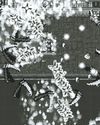Can a fighting game survive the effects of a random loot system?

The great and seemingly irreconcilable challenge for fighting-game makers is how to allow newcomers to feel briskly competent at a game while simultaneously affording the aficionados with sufficient depth and nuance. Nether Realm Studios’ output skews toward the former group. There are no complicated SNK-style joystick incantations in its previous title Mortal Kombat X. Likewise, in Injustice 2, the studio’s second DC-universe fighting game, even the most demanding special moves need only a few directional taps before they explode across the screen.
The game’s chances at earning a slot in a major fighting-game tournament may be stymied further by a new and labyrinthine gear system. At the end of each match you’re awarded with random loot, typically pieces of armour and weaponry that can be used to improve or customise the play style of your hero. Each of the characters has four slots for armour and one for an accessory. These pieces have their own buffs and stat upgrades that are spread across four attributes: strength, defence, health and abilities (for example, you may choose to equip Batman with a special batarang, or focus on parries and evasions).
Esta historia es de la edición May 2017 de Edge.
Comience su prueba gratuita de Magzter GOLD de 7 días para acceder a miles de historias premium seleccionadas y a más de 9,000 revistas y periódicos.
Ya eres suscriptor ? Conectar
Esta historia es de la edición May 2017 de Edge.
Comience su prueba gratuita de Magzter GOLD de 7 días para acceder a miles de historias premium seleccionadas y a más de 9,000 revistas y periódicos.
Ya eres suscriptor? Conectar

BONAPARTE: A MECHANIZED REVOLUTION
No sooner have we stepped into the boots of royal guard Bonaparte than we’re faced with a life-altering decision.

TOWERS OF AGHASBA
Watch Towers Of Aghasba in action and it feels vast. Given your activities range from deepwater dives to climbing up cliffs or lumbering beasts, and from nurturing plants or building settlements to pinging arrows at the undead, it’s hard to get a bead on the game’s limits.

THE STONE OF MADNESS
The makers of Blasphemous return to religion and insanity

Vampire Survivors
As Vampire Survivors expanded through early access and then its two first DLCs, it gained arenas, characters and weapons, but the formula remained unchanged.

Devil May Cry
The Resident Evil 4 that never was, and the Soulslike precursor we never saw coming

Dragon Age: The Veilguard
With Dragon Age: The Veilguard, BioWare has made a deeply self-conscious game, visibly inspired by some of the best-loved ideas from Dragon Age and Mass Effect.

SKATE STORY
Hades is a halfpipe

SID MEIER'S CIVILIZATION VII
Firaxis rethinks who makes history, and how it unfolds

FINAL FANTASY VII: REBIRTH
Remaking an iconic game was daunting enough then the developers faced the difficult second entry

THUNDER LOTUS
How Spirit farer's developer tripled in size without tearing itself apart